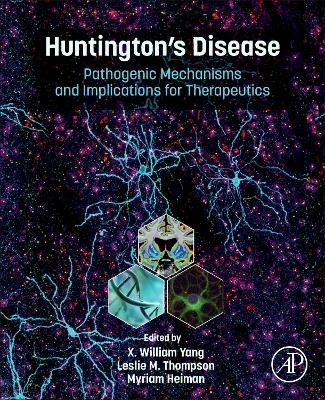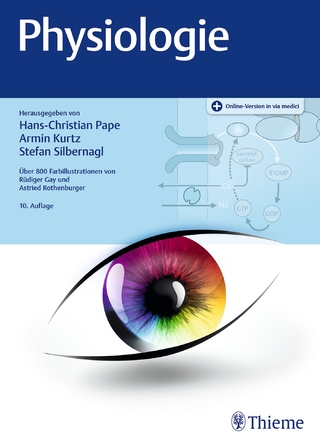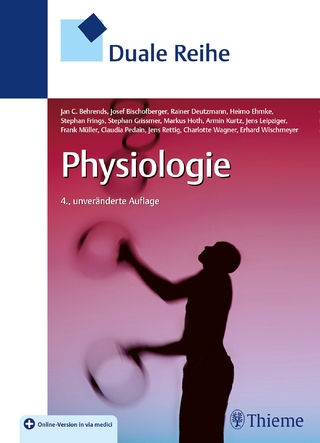
Huntington’s Disease
Academic Press Inc (Verlag)
978-0-323-95672-7 (ISBN)
Dr. X. William Yang completed his B.S./M.S. degrees in Molecular Biophysics & Biochemistry at Yale University in 1991. He obtained M.D./Ph.D. training at Rockefeller University (Ph.D., 1998) and Weill Medical College of Cornell University (M.D., 2000). He co-invented the technology to engineer Bacterial Artificial Chromosomes (BACs) and to generate BAC transgenic mice. His laboratory at UCLA (established in 2002) pioneered the use of a BAC transgenic approach in mice to study pathogenesis of neurodegenerative disorders including Huntington’s disease, Parkinson’s disease, and Alzheimer’s disease. The Yang lab has also applied novel genetic and systems biology approaches to study molecular networks in healthy and disease brains, and to study brain-wide morphology of genetically-defined neurons. He is a recipient of BRAIN Initiative Awards from NIH, Brain Disorder Award from McKnight Foundation, the Leslie Gehry Brenner Prize for Innovation in Science in 2014, and is an elected member of the American Society for Clinical Investigation. Myriam Heiman and her lab use HD patient tissue, as well as mouse and cell models of HD to understand why some cells are more or less vulnerable to the mutant HD gene, and use knowledge of these intrinsic differences to identify new therapeutic targets for HD. Dr. Heiman has pioneered the use of in vivo genetic screening in the mammalian brain, as well as the use of novel single-cell and cell type-specific transcriptional profiling tools to study HD. Her work has recently pointed to the importance of neuronal innate immune activation and cell type-specific mitochondrial dysfunction in HD pathogenesis. Myriam is the recipient of several awards, including an Early Career Investigators Innovation Award from the Bumpus Foundation and a EUREKA grant from the National Institutes of Health. Dr. Thompson is a Donald Bren and Chancellor’s Professor in the Departments of Psychiatry and Human Behavior and Neurobiology and Behavior at the University of California Irvine. She has studied Huntington’s disease (HD) for most of her scientific career and was a member of the international consortium that identified the causative gene for HD in 1993. Since that time, the Thompson laboratory has been actively engaged in investigating the fundamental molecular and cellular events that underlie how the mutant HD gene causes degeneration of specific brain cell populations to induce motor and cognitive decline and premature death of patients with the ultimate goal to develop new treatments, including stem-cell based treatments. Dr. Thompson is the recipient of several awards including the HDF Lesley Gehry Brenner Award for Scientific Innovation in 2013, an NIH Research Program R35 Award and was elected an AAAS fellow in 2013.
1. Huntington’s Disease: Clinical Features, Genetic Diagnosis, and Brain Imaging Carlos Estevez-Fraga, Mitsuko Nakajima and Sarah J. Tabrizi 2. Revolutionizing Clinical Research and Communication in Huntington’s Disease: The Huntington’s Disease Integrated Staging System (HD-ISS) Cristina Sampaio, Jeffrey D. Long, Alexandra Mansbach, Sarah J. Tabrizi, Emily C. Gantman 3. Huntington’s Disease Genetics: Implications for Pathogenesis Marcy E. Macdonald, Jong-Min Lee and James F. Gusella 4. The Instability of the Huntington’s Disease CAG Repeat Mutation Vanessa C. Wheeler, Joseph C. Stone, Thomas H. Massey and Ricardo Mouro Pinto 5. Mechanisms of Somatic CAG -Repeat Expansions in Huntington’s Disease Amit L. Deshmukh, Terence Gall-Duncan and Christopher E. Pearson 6. RNA-Mediated Pathogenic Mechanisms in Huntington’s Disease Gillian P. Bates, Sandra Fienko, Christian Landles and Aikaterini-Smaragdi Papadopoulou 7. Huntingtin Protein-protein Interactions: From Biology to Therapeutic Targets Eduardo Silva Ramos, Todd M. Greco, Ileana M. Cristea and Erich E. Wanker 8. Repeat-Associated Non-AUG (RAN) Translation and Huntington’s Disease: Pathology, Mechanistic and Therapeutic Perspectives Monica Banez-Coronel, John Douglas Cleary and Laura P.W. Ranum 9. Proteostasis Function and Dysfunction in Huntington’s Disease Juliana Abramovich, Korbin Kleczko, Vincent Masto and Judith Frydman 10. Autophagy and Huntington’s Disease Katherine R. Croce, Hilary Grosso Jasutkar and Ai Yamamoto 11. SUMO Modification in Huntington’s Disease: Unraveling Complex Mechanisms for Therapeutic Insights Charlene Smith, Joan S. Steffan and Leslie M. Thompson 12. Selective Vulnerability in Huntington’s Disease: From Excitotoxicity, Mitochondrial Dysfunction, and Transcription Dysregulation to Therapeutic Opportunity Jacob S. Deyell, Ravinder Gulia and Albert R. La Spada 13. Pathophysiology of Synapses and Circuits in Huntington Disease Marja D. Sepers, James Mackay and Lynn A. Raymond 14. The Role of Glial Pathology in Huntington’s Disease Steven A. Goldman 15. Systems Biology Study of Huntington’s Disease Leonardo E. Dionisio, Peter Langfelder, Jeffrey S. Aaronson, Jim Rosinski and X. William Yang 16. Unbiased Genome-Wide Approaches to Identify Vulnerability Factors in Huntington’s Disease Suphinya Sathitloetsakun and Myriam Heiman 17. Striatal Neuronal Models of Huntington’s Disease Via Direct Conversion: Modeling Age-dependent Disease Phenotypes Young Mi Oh, Seong Won Lee and Andrew S. Yoo 18. Genetic Mouse Models to Explore Huntington’s Disease Mechanisms and Therapeutic Strategies Michelle Gray, Scott O. Zeitlin, Aida Moran-Reyna and Jeh-Ping Liu 19. Huntington’s Disease: From Large Animal Models to HD Gene Therapy Sen Yan, Xiao-Jiang Li and Shihua Li 20. Deep Learning and Deep Phenotyping of HD iPSCs: Applications to Study Biology and Test Therapeutics Steven Finkbeiner 21. The Promise of an Underappreciated Therapeutic Target: Sleep and Circadian Rhythm Dysfunction in Huntington’s Disease Christopher S. Colwell, Weiyi Tan and A. Jennifer Morton 22. Huntingtin Lowering Therapeutics Neil Aronin, Miguel E. Sena-Esteves, Anastasia Khvorova, Marian Difiglia and Michael Brodsky 23. Gene Editing for HD: Therapeutic Prospects Richard Z. Chen and Thomas F. Vogt 24. Current Clinical Trials of New Therapeutic Agents for Huntington’s Disease Blair R. Leavitt
| Erscheinungsdatum | 27.02.2024 |
|---|---|
| Verlagsort | Oxford |
| Sprache | englisch |
| Maße | 191 x 235 mm |
| Gewicht | 450 g |
| Themenwelt | Studium ► 1. Studienabschnitt (Vorklinik) ► Physiologie |
| Naturwissenschaften ► Biologie ► Humanbiologie | |
| Naturwissenschaften ► Biologie ► Zoologie | |
| ISBN-10 | 0-323-95672-6 / 0323956726 |
| ISBN-13 | 978-0-323-95672-7 / 9780323956727 |
| Zustand | Neuware |
| Informationen gemäß Produktsicherheitsverordnung (GPSR) | |
| Haben Sie eine Frage zum Produkt? |
aus dem Bereich


